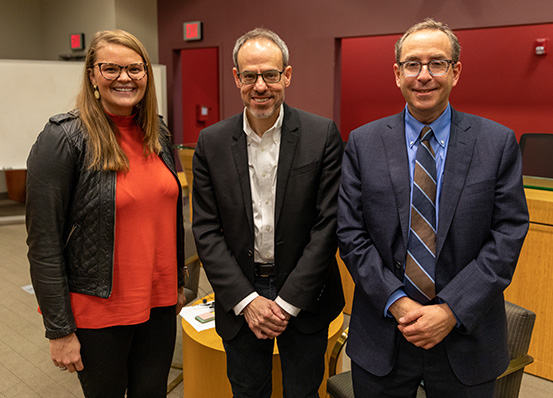Amazon’s Senior Vice President, General Counsel and Secretary David A. Zapolsky spoke at Drexel University’s Thomas R. Kline School of Law on Tuesday, November 16. The event, titled “Law and Evolving Technologies: A Conversation with David A. Zapolsky, General Counsel and Senior Vice President of Amazon.com, Inc.” was a Q&A-style discussion between audience members, Zapolsky and Kline Law Professor Jordan L. Fischer, who directs the Center for Law and Transformational Technology (CLTT), which hosted the event.
Opening the discussion, Dean Daniel Filler noted that the event marked the launch of the CLTT, which will allow students, faculty and industry stakeholders “to engage around the kinds of issues that are likely to shape the practice of law, both explicitly and then implicitly, for decades.”
Zapolsky and Fischer discussed this theme as well, with Zapolsky expounding on five legal issues that he thinks will be the biggest challenges for the technology industry in the next decade. These issues were:
-
Operating multinational businesses with transactions across borders and in countries with different ethical, cultural and legal concerns;
-
Establishing security, which Zapolsky described as primarily a technological issue that legal experts could offer advice on but not tackle alone;
-
Protecting customer privacy, which Zapolsky said was an “existential risk,” because a breach in privacy could cause customers to lose trust in the company;
-
Addressing product-related risks, like navigating product safety disclosure laws across multiple borders; and
-
Ensuring antitrust laws aren’t breached, which Zapolsky said is an issue he’s been considering since 2000.
 Left to right: Jordan Fischer, director of the Center for Law and Transformational Technology and assistant teaching professor; David Zapolsky, senior vice president, general counsel and secretary of Amazon.com, Inc.; and Dan Filler, dean and professor of law
Left to right: Jordan Fischer, director of the Center for Law and Transformational Technology and assistant teaching professor; David Zapolsky, senior vice president, general counsel and secretary of Amazon.com, Inc.; and Dan Filler, dean and professor of law
Zapolsky also spoke about his career path, saying “my path wasn’t predictable. It was never my goal in life to be general counsel of a Fortune 10 company.” By beginning his career as an assistant district attorney in the Brooklyn District Attorney’s Office, Zapolsky developed the managerial skills needed to juggle multiple cases, deadlines and clients—skills he has used as general counsel. Zapolsky then transitioned to business litigation at Wachtell Lipton Rosen & Katz in New York and became a partner at the offices of Dorsey & Whitney and Bogle & Gates in Seattle, where he moved in the early 1990s.
In November 1999, Zapolsky joined Amazon as “the first and then only litigation and regulatory lawyer in [Amazon’s] small but mighty in-house department of about 15 people.” He said that from the beginning he was “insanely happy there” and “I thought it was an amazing place, mostly because the colleagues who surrounded me were amazing people, amazing lawyers, and, mostly, now amazing friends.”
When offered the general counsel position, Zapolsky was hesitant at first. “But after a weekend of reflection,” Zapolsky said. “I realized you actually don’t turn down the opportunity to be general counsel when you’re asked by your boss to do that. Because, you know, it’s not just her asking. It’s the CEO; it’s the board. So, with some trepidation, I agreed to take the job.”
Being in-house counsel in a technology organization can be more involved than in-house positions at other types of organizations, according to Zapolsky, although he noted that the degree of variation depends on the specific organization. At Amazon, the lawyers are always “in the room,” according to Zapolsky. “The business people want the lawyers’ input on more than just the legal stuff. You’re there to contribute whatever ideas you have.”
Fischer reflected on the event, noting that “David provided a fantastic overview of the winding path that so many attorneys take, demonstrating that students from a wide variety of experiences can pursue technology-oriented careers.”
The event ended with a question from CLTT student research fellow Hina Moheyuddin, who asked what principles have guided Zapolsky throughout his career. “That’s a deep question,” responded Zapolsky. “First of all, I’ll say I am having a blast. I feel like I’m the luckiest lawyer alive to do the job I get to do.”
Zapolsky then explained why, early in his career, he did not take jobs according to what would look best on a resume. “I knew in my heart I wouldn’t be happy if I took the high-resume, high-compensation choice. I knew it wouldn’t make me as fulfilled…..” He then advised students, “When you have a choice like that and you follow what you know will make you most passionate, you actually end up being the person that people want to hire. You put yourself in a position to take advantage of good luck later on, because you do your best work; you’re open to connections; you make friends; you’re happy.”